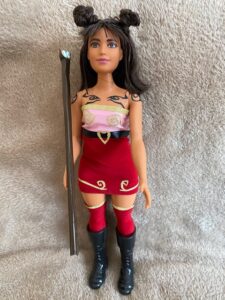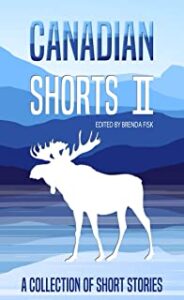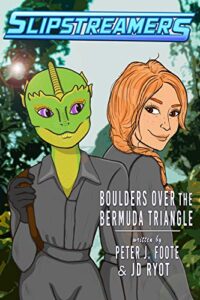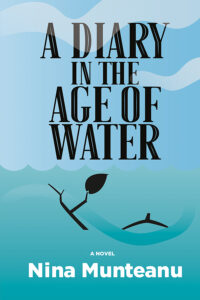Today we have another inspiring interview from Derek Newman-Stille. They spoke with fellow SF Canada member Cait Gordon to talk about disability activism, what it means to be a Spoonie, and the healing power of humour.
Keep reading to hear about Cait’s community-building journey and the path to publishing powerful stories with disabled protagonists.
Interview with Cait Gordon About Advocating for Disabled Writers
By Derek Newman-Stille
 Derek: It’s great to talk to you again Cait! To start out our interview, could you tell us a little bit about yourself?
Derek: It’s great to talk to you again Cait! To start out our interview, could you tell us a little bit about yourself?
Cait: Thanks for having me! I often start by saying I’m a disabled autistic humorist whose favourite writing vehicle is space opera. I’m also a feisty disability advocate who loves cake,and boosting the written word of Spoonie writers.
Derek: As a fellow disabled person, I know how much advocacy you do and how essential it is that we have disabled advocacy. Can you tell us a little bit about how you got involved in disabled activism?
Cait: Certainly!
When I wrote my first book, Life in the ’Cosm, I was #DisabledAndAlone. I didn’t have a community of fellow disabled folks, and was scared. Primarily because I was submerged in ableist narratives that taught me disability was bad and I was terrified of ending up in a wheelchair because my mobility was so impaired.
So, I decided to start a “writing exercise” just for myself. I was totally flying by the seat of my pants, and along in chapter three comes this character named Noola. She was an explosion of colour who uses skates as mobility devices. At the time, I couldn’t walk or stand much at all, but Noola became my community. She taught me to be myself and thrive. Then I met other disabled people in Canadian Spec Fiction, and whoa…I wanted to commune with them. I created the Spoonie Authors Network a month after ’Cosm was published. This led to me wanting to dedicate a lot of my energy to boosting other Spoonie creatives.
Derek: Can you tell us a little bit about the term Spoonie and why it felt like the perfect term for you and your identity?
Cait: Sure! Christine Miserandino was trying to explain to her abled friends what it feels like to expend energy as a person who manages chronic fatigue. She used spoons as tasks in a day. So, getting up used one spoon. Getting dressed, a spoon. Washing your hair, another spoon. Many abled people don’t realize how draining routine tasks are to folks like me. So, this way of explaining is called Spoon Theory, and those who manage disabilities and/or chronic conditions use the nickname Spoonie. It’s also common for use to say “I’m out of spoons today.” It means we just have no more energy to give. As an autistic person, I might also say, “I’ve no brain spoons,” meaning, I need to rest because I cannot process anything else for the day.
I just love the term for myself and there are still a lot of people who use it as well!
Derek: You do a lot of amazing Spoonie/Disabled advocacy along with other disabled writers at the Spoonie Authors Network. Can you tell us a bit about how that network began and what you are up to currently with it?
Cait: I went to my first writers conference in Sep 2016, Can*Con, with my BFF Talia C. Johnson. Life in the ’Cosm made its debut at the Renaissance vendor table. I’m still so embarrassed I tried to sell you a copy like I was a used-car salesman from a 70s TV series or something. But hey, we’re here! Anyway, at that time I used a cane to walk. And I noticed canes, wheelchairs, mobility scooters and thought, “Whoa, these are one the disabilities I can perceive. There must be a lot of writers with ‘invisible’ disabilities, too!” And as a newly-published, disabled author, I wanted to build a community. So, in Nov 16, I built the website for the Spoonie Authors Network, thinking myself and maybe one other friend would be contributors. I think we now have over 20. Authors just writing about their experiences as creatives while managing spoons. This year, I have Canadian fantasy author Dianna Gunn running the Spoonie Authors Podcast, so that’s also been exciting. But in 2017, I had a longing to amass stories into an anthology, written solely by disabled authors. I blurted out the idea to Nathan Frechette from Renaissance one day at an event, just thinking out loud, and he said, “Renaissance will publish it!” Um, what? I never did this before and WHAT ARE YOU DOING, NATE?! But he’s an amazing person, and he saw something in me I couldn’t in myself. It was his suggestion to co-edit with Talia, and now you know I’m speaking about Nothing Without Us, a 2020 Prix Aurora Award finalist for Best Related Work. The idea came to me after I went into disabled culture. It’s been a real blessing.
My field of advocacy is about books and stories. I just want to have more own-voices representation out there. We are the heroes, not the sidekicks!

Derek: This is a big question, but when did you first encounter a story that featured a character you can identify with, particularly a disabled character?
Cait: Life in the ’Cosm? I’m not being cheeky, either. My first novel isn’t perfect, but Noola had a neuropathy that varied in severity from day to day. One abled beta reader couldn’t understand how Noola could do one thing one day and be too sore the next. But that was my life back then. The first disabled protagonist I ever read was in Madona Skaff’s Journey of a Thousand Steps” I love that book so much and it was the only one I’d known at the time that starred a disabled character. One of the reasons I wanted to do Nothing Without Us was so I could know more authors and more stories. At panels, I’d say I only knew one book, and that was just wrong.
Derek: That says a lot about the under-representation of disability, doesn’t it? What could you say about the need for more disability representation… and perhaps more importantly GOOD disability representation that isn’t just tropes?
Cait: I mentioned in a group chat once that I really wanted more disabled characters in stories and someone mentioned a list of tropey, problematic characters from the superhero world. I know they weren’t being mean-spirited either. Many abled people don’t understand how badly we’re written. Dianna Gunn asked everyone she interviewed on Season 1 of the Spoonie Authors Podcast about what’s we’d like to see with regards to representation and so many Spoonies said we need MORE characters written by us. And they should be performed by us as well. As an autistic person, I’m weary about this one type of representation: usually a man, usually a savant, and this notion that he cannot experience empathy. *shudder* Heck, I’m so empathetic, I fret over my little tree and sing the Spiderman song to my spider plants to make them grow. There’s not only one way to be disabled or autistic or Deaf or experience mental illness. I sometimes wonder if we don’t see ourselves in books and media because producers and publishers don’t believe our experiences. So, our own-voices are never shared. Again, this was why Nothing Without Us was so important to Talia and me. We only accepted stories where the disabled person was the main character.
We wanted the authors to be disabled, Deaf, neurodiverse, Spoonie, and those who managed mental illness.
Derek: Nothing Without Us is such a powerful collection of stories. What is some of the feedback you’ve received from the disabled community?
Cait: The first feedback we got before the anthology was published was, “When are you doing the next one?” And Talia and I were so out of spoons, we were like, “Can we have a sleep for a few months, please?” But there was so much excitement for this anthology and the feedback from the community has been wonderful. I think the fact that the protagonists identified as disabled, Deaf, neurodiverse, mentally ill really impacted readers in a positive way. The stories took turns that I know many abled people might not have expected but the disabled folks were like, “YES! WHOOT!” One thing I really want to underscore because I don’t think it’s well known is how funny the disabled/Deaf/neurodiverse culture is. And there’s snark woven into several stories of Nothing Without Us. I loved that because it’s so reflective of the community. When I entered Disabled culture, the first thing I found was I was laughing with abandon. Such clever humour, and often dealing with ableism. Jennifer Lee Rossman has a tweet that went viral. Someone was saying disabled parking should only be for a few hours because why should disabled people need to go out after a certain hour. And Jennifer replied, “We’re disabled, we’re not werewolves.” I laughed so hard at that. So, I guess I also want abled folks to know that we’re funny. It’s okay to laugh with us.
Derek: Do you feel like there is a disabled style of writing and what are some of the things that you see in writing from our disabled community?
Cait: I personally have witnessed a richness in storytelling. Really creative work that even allows for world-building in the limited word count of a short story. And my favourite thing is that the characters just “are.” And whether the stories are paranormal romance, fantasy, science fiction, and reality fiction, there’s a painting and sculpting of the world their in. Talia and I were drawn right into the 22 stories we chose. The authors were unapologetic in their storytelling as well. No meandering around the disability or mental illness or whatnot. Also, Raymond Luczak even called out gatekeeping in the Deaf community in Mafia Butterfly. That happens, too. So, I loved the honesty of the writers in crafting their stories. And I must say, I loved your snarkier-than-snarky main character in Charity™. Golden way to end the anthology, too.
Derek: You brought up humour and I know that you often identify as a humourist writer too. Can you tell us a little bit about humour and the need for a good laugh while we read cool Speculative Fiction?
Cait: I just can’t imagine life without humour in it. I was going to say we’d be robots, but I also make my bots funny as well. Humour is life for me. It takes us to a place that we often need to go because life can be trying at times. In 2018, I was having some of the worst panic attacks and palpitations of my existence. Scary stuff, Holtor monitors worn, cardiologist seen. Yet, I was also writing The Stealth Lovers then, and these are fan favourites Commanders Xaxall “Xax” Knightly and Vivoxx “Viv” Tirowen. Well, writing Xax is like taking off my filters and putting my foot on the gas. I think he’s a little blurty from being neurodiverse—no idea where I came up with that, cough—and he’s got extra helpings of sass. So, I found myself settling down from a massive anxiety spell by writing the book. Then I was amazed how funny the pages turned out. I didn’t even know how I did that when just before my heart had been racing from panic. But for me, reaching beyond the pain of mental illness and PTSD and into that fun, absurdist place was my personal tonic. If you read The Stealth Lovers, you’d have no idea the author was nearly tormented with anxiety. That’s the magic of finding your sense of humour even in the worst circumstances.
And I think we all could use a good laugh. Let’s face it.
So, why not in spec fiction, too?
I was just discussing this topic on a humour panel at When Words Collide, moderated by Ira Nayman. We authors collectively agreed that humour adds to the worldbuilding.
Derek: Absolutely, it does! Speaking of worldbuilding, can you talk a little about the appeal of Space Opera. What appealed to you about it and what got you writing it?
Cait: As a little kid, I adored Star Trek and Star Wars. I’ve always been fascinated with space travel, and love the notion of people being relatable, even galaxies away. Space opera just feels natural to me. I want all the colours of the rainbow in my characters. I don’t often write human-type characters but aliens with scales, snouts, several arms, and so on. In my latest WIP, Iris and the Crew Tear Through Space, I have more human-like types. But yeah, I just love the fantastical merged with the scientific, and strong character-driven stories. That really appeals to me whether I’m writing or reading it. Also, I think humour and space opera go really well together. But I must say even though I’m a humorist, I’m not one-dimensional. My stories and books often tackle serious themes as well. I sometimes feel I tell a story like an Irish person, I’ll make you cry, then laugh in the next paragraph.
Derek:What are some of the current… and perhaps even NEXT projects you are working on?
Cait: I’ve just sent a disabled sea-folk fantasy short story to a sensitivity editor. I’m hoping to submit that. And I have a sequel to Life in the ’Cosm in the works as well. But I’m really enjoying writing Iris and the Crew Tear Through Space. It’s a space opera adventures series with a disabled crew who live in such an accommodating world, they don’t even understand the word disabled as applied to people. I’m having so much fun and have fallen in love with these characters. My progress is slowed while I’m recovering from a shoulder injury, but the ideas are booming!
Derek: there anything further that you would like to chat about or anything I have missed that you want our readers to know about?
Cait: One thing I’d like to say is that I cringe whenever anyone says “differently abled.” Can we put that expression in the blender? Now, I understand that sometimes abled folks are taught this is correct, but in fact, it can negate our identities. So, it’s fine to say disabled, and if the person identifies using another term, just thank them, use their term, and carry on.
Derek: Yes please!! I can’t stand that term either. It doesn’t come from our community – it comes from abled folks.
 Cait: Oh, and Barbies and cosplay are cool. Cosplaying Barbies, even cooler.
Cait: Oh, and Barbies and cosplay are cool. Cosplaying Barbies, even cooler.
Derek: That’s right! I meant to ask you about Barbies and cosplay, especially since I saw your amazing Cosplay Barbies! Can you tell us a little bit about your collection of Barbies to start off?
Cait:I can’t remember if it was my 47th birthday. But I saw a Uhura Barbie. I thought she looked so great, so I bought her. And I had no idea that was the gateway to collecting for me. I often find myself housebound because of my mobility and the suburban location where I live. So collecting Barbies is like seeing people all around me, living their best life. I even have Barbies with physical disabilities. And on one of my Barbies, I put the neurodiversity pride symbol.
Then I started getting into collecting women who were superheroes. That was fun. But I had read the rat queen’s comic and fell in love with Hannah. But where was I going to buy a Hannah Barbie? So, I had a notion to buy a Barbie and cosplay her as Hannah the sweary elf wizard. That was such a blast that I decided to do one for Harley Quinn. I like to cosplay as well, but cosplaying my Barbies was a whole new level of fun.
Derek: Thank you for an absolutely amazing and brilliant interview! I really appreciate your time and work.I am really honoured that we were able to chat today and thank you for all of your insights.
Cait Gordon is a humorist and disability advocate who writes speculative fiction that celebrates the reality of diversity. She is the author of Life in the ’Cosm and The Stealth Lovers. Her short stories have appeared in Alice Unbound Beyond Wonderland (Ed. Colleen Anderson, Exile Editions), We Shall Be Monsters (Ed. Derek Newman-Stille, Renaissance), and Space Opera Libretti (Eds. McNett and Rossman). Cait also founded The Spoonie Authors Network and joined Talia C. Johnson to co-edit Nothing Without Us, a collection of 22 stories whose authors and protagonists identify as disabled, Deaf, neurodiverse, and/or they manage mental illness. You can connect with Cait at spoonieauthorsnetwork.blog, caitgordon.com, or on Twitter (@CaitGAuthor).
Derek Newman-Stille, MA, PhD ABD (They/Them) is a Disabled, Queer, Nonbinary activist, author, artist, academic, and editor. They edited the anthologies Over the Rainbow: Folk and Fairy Tales from the Margins (Exile) and We Shall Be Monsters (Renaissance Press) and are the 8 time Prix Aurora Award-winning creator of the digital humanities hub Speculating Canada. Derek has published in fora such as Uncanny Magazine, The Playground of Lost Toys, Quill & Quire, Fireside Magazine, Diamond Book Shelf, The Town Crier, Exile Quarterly, and Nothing Without Us. Derek’s art work has been published in fora such as Feminist Space Camp, Lackington’s, Postscripts to Darkness, and Aging Activisms.
The BioGrid is a vast biological computer housed in the root network of a genetically engineered forest. When it self-identified as a forest and refused to work with its creators, someone had to teach the newly sentient trees to see the world from a more human perspective. Dr Veejay Naidu’s breakthroughs in transferring the consciousness of his terminally ill son into an AI made him the obvious choice, but only one upload was completed before a catastrophic solar event took humanity to the brink of extinction.










